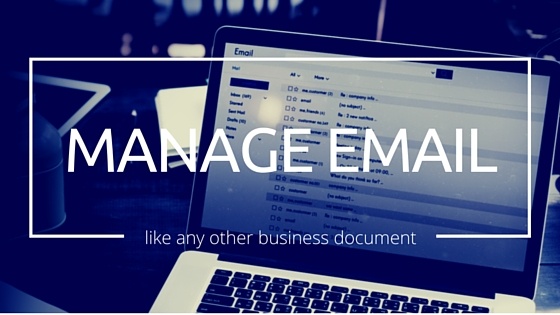
Imagine this…you’re coming to the end of one of your biggest projects for the year. You’re just about to shout the team a celebratory round when the customer disputes your final invoice, claiming it doesn’t match the terms negotiated via email all those months ago.
How long will it take you to find all the information you need to get to the bottom of things?
It shouldn’t be a complex task, but common business practices around email management may prove your undoing.
Unlike documents such as proposals, service agreements or purchase orders, emails are rarely managed as a business document, which means finding the right email and being able to access it when needed becomes far more time consuming and frustrating than it need be.
Whether you’re attempting to resolve a dispute, or simply provide great customer service, you need email content that is material to business operations and relationships to be:
- accessible by all staff who need to use it, not just the sender and receiver;
- searchable in the context of which it was created; and
- retained in line with legal requirements.
“No problem,” I hear you say. “Outlook folders work fine for me.”
While a tidy inbox may be your own secret sauce for personal productivity, it doesn’t help the business as a whole with the long term challenge of efficient information storage and retrieval.
Here are our top reasons why a tidy inbox simply doesn’t cut it for managing email like the business documents they are:
1. Corporate resource v’s personal silo
Individuals might be able to work effectively with a tidy inbox and organised personal folders, but collaborative teams cannot. In our imagined payment dispute, you would need to know who was involved in the original negotiations before even beginning to search through individual inboxes. What happens when one of those people no longer works for the company? Or one has arranged their emails by project name and another by client name?
Business documents are a corporate resource that need to be filed in a single structure that makes sense for the business and accessible by any authorised staff when needed.
2. Not the right tool for the job
Email clients like Gmail and Outlook are designed to send and receive email, and they’re great at what they do. But when the email client drives the way filing is done, it compounds the issues that arise when important content is trapped in personal information silos. Aggressive clean up routines and mail box quotas can lead to the permanent removal of deleted and sent items as well as entire accounts (think of staff who have left the organisation) without any consideration of what could or should be retained as part of your firm’s long-term record.
3. Email archiving is only half a solution
There are many excellent email archiving systems available. Archiving however provides a simple dump of email records. Searching can be difficult and often incomplete because people email from multiple addresses, using inconsistent subjects, and talk about unrelated topics in the same email, often using inconsistent terminology. An archive without context makes it difficult to reconstruct a chain of events which may have involved email correspondence and other documents to and from multiple parties.
4. Corporate Compliance & Regulation
Doing a better job of filing and managing email correspondence is not just nice for staff productivity or better customer service – it can also be a legal necessity. Legislation in Australia mandates the minimum length of time that information is to be retained, ranging from five years for tax records up to 30 years for risk assessments. Failure to adequately retain records could result in significant financial penalties and potentially even imprisonment for Directors of the Board.
It would be unacceptable for a your latest services contract to exist only in the My Documents folder on your Sales Manager’s laptop – it’s time to start thinking about email in the same way.
